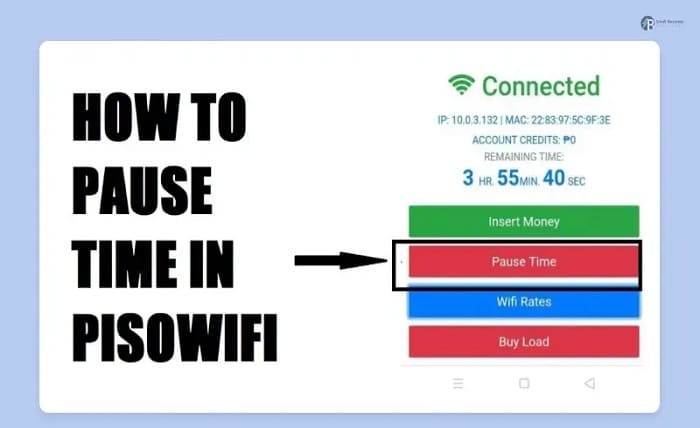The Mystery of pause time wifi

The modern world craves instant gratification. We expect our coffee brewed in seconds, our emails answered immediately, and our online entertainment streamed flawlessly. But what happens when our trusty Wi-Fi throws a wrench in the works, pausing our precious internet flow and sending shivers of frustration down our spines? The culprit, in many cases, is a mysterious entity known as pause time.
Pause Time: The Invisible Culprit
Pause time, in the realm of Wi-Fi, refers to the brief but noticeable delay between sending data from your device and receiving a response. It’s the micro-hiccup that disrupts your video call, the agonizing stutter that halts your online game, and the infuriating lag that makes web browsing feel like navigating molasses.
But what causes this invisible gremlin to wreak havoc on our internet experience? Here are some common culprits:
Network Congestion: Imagine a highway crammed with cars. When too many devices try to access the internet at once, data packets (the cars) get stuck in traffic, leading to increased pause time.
Signal Interference: Walls, furniture, and even other electronic devices can interfere with Wi-Fi signals, creating dead zones and weak connections that contribute to pause time.
Outdated Hardware: Older routers and modems may struggle to handle the demands of modern internet usage, resulting in slower speeds and higher pause times.
Software Issues: Glitches or bugs in your device’s operating system or network drivers can disrupt data transmission, leading to lag and pauses.
The Problem: Detecting Pause Time in the Wild
So, how do you know if pause time is the culprit behind your internet woes? Here are some telltale signs:
Frequent buffering during streaming: Movies, shows, and even music streams pause unexpectedly, forcing you to wait in agonizing silence.
Lag in online games: Your character moves jerkily, shots fire out of sync, and you constantly fall victim to rubberbanding (players teleporting around).
Slow download and upload speeds: Files take ages to download, and sending emails or uploading photos feels like an eternity.
- Choppy video calls: Your voice cuts out mid-sentence, video freezes in pixelated squares, and conversations become a frustrating game of catch-up.
Conquering the Pause: Strategies for Smoother Sailing
If you’re tired of pause time throwing your internet experience into disarray, fear not! Here are some tips to combat this invisible foe:
Upgrade your router and modem: Invest in newer devices that can handle the demands of your internet usage and offer better range and signal strength.
Optimize your network: Reduce the number of devices connected to your Wi-Fi, reposition your router for optimal coverage, and disable unused features like guest networks.
Use a Wi-Fi extender or mesh network: If your home has dead zones, consider extending your Wi-Fi signal with a repeater or creating a mesh network for seamless coverage throughout your space.
Prioritize bandwidth: Allocate more bandwidth to devices that require uninterrupted internet access, such as streaming devices and gaming consoles.
Update your software: Ensure your device’s operating system and network drivers are up to date to avoid software-related glitches.
Consider switching internet service providers: If all else fails, it might be time to compare plans and explore different internet service providers in your area.
Conclusion:
Pause time may be a mysterious entity, but understanding its nature and armed with the right strategies, you can reclaim control of your Wi-Fi experience. By optimizing your network, keeping your devices updated, and investing in proper equipment, you can banish the stutters and lags, paving the way for a smooth, uninterrupted internet journey. Remember, a happy Wi-Fi connection equals a happy you!
FAQ
- What’s the difference between pause time and latency?
Pause time is the perceived delay between sending and receiving data, while latency is the actual time it takes for data to travel between two points. Pause time can be influenced by factors beyond just latency, such as network congestion and processing power.
- How can I measure pause time?
Several online tools and apps can measure your internet speed and ping (a measure of latency), which can give you an idea of your overall network performance. However, directly measuring pause time can be more complex and often requires specialized tools or software.
- Does my internet service provider (ISP) offer any solutions for pause time?
Some ISPs offer features like Quality of Service (QoS) settings that prioritize bandwidth for specific applications, like streaming or gaming, which can help minimize pause time during these activities. Check with your ISP for their specific options.
- Should I switch to a wired connection if my Wi-Fi has frequent pause time?
A wired connection can offer lower latency and more consistent speeds than Wi-Fi, especially if your Wi-Fi network is experiencing significant interference or congestion. However, wired connections might not be feasible in all situations, depending on your home layout and desired flexibility.
- What are some future technologies that might help reduce pause time?
Technologies like Wi-Fi 6E and fiber optic internet offer the potential for significantly faster speeds and lower latency, which could ultimately minimize pause time. Additionally, advancements in network management and optimization techniques are continuously being developed to improve overall internet performance.




